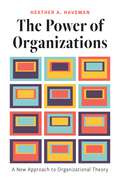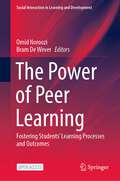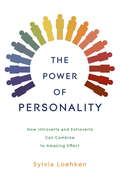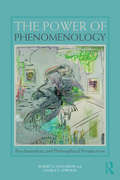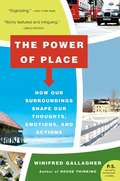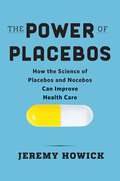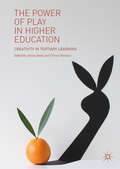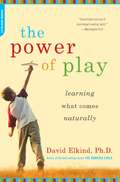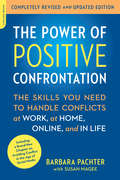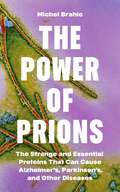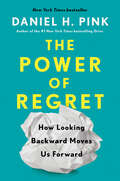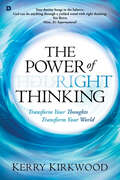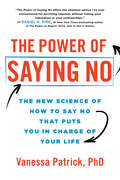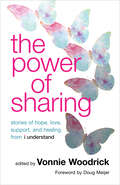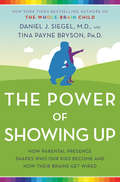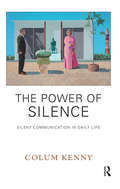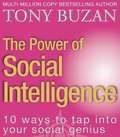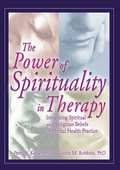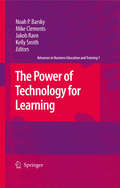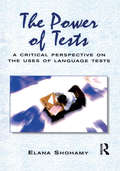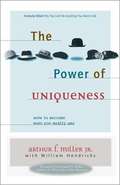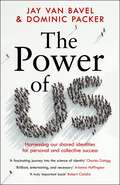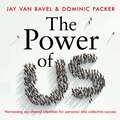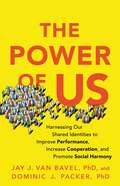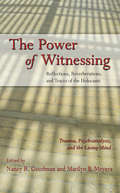- Table View
- List View
The Power of Organizations: A New Approach to Organizational Theory
by Heather A. HavemanHow organizations developed in history, how they operate, and how research on them has evolvedOrganizations are all around us: government agencies, multinational corporations, social-movement organizations, religious congregations, scientific bodies, sports teams, and more. Immensely powerful, they shape all social, economic, political, and cultural life, and are critical for the planning and coordination of every activity from manufacturing cardboard boxes to synthesizing new drugs and reducing greenhouse gas emissions. To understand our world, we must understand organizations. The Power of Organizations defines the features of organizations, examines how they operate, traces their rise over the course of a millennium, and explains how research on organizations has evolved from the mid-nineteenth century to today.Heather Haveman shows how almost all contemporary research on organizations fits into three general perspectives: demographic, relational, and cultural. She offers constructive criticism of existing research, showing how it can be remade to be both more interesting and influential. She examines how we can use existing theories to understand the changes wrought by digital technologies, and she argues that organizational scholars can and should alter the impact that organizations have on society, particularly societal and global inequality, formal politics, and environmental degradation.The Power of Organizations demonstrates the benefits and dangers of these ubiquitous foundations of modern society.
The Power of Peer Learning: Fostering Students’ Learning Processes and Outcomes (Social Interaction in Learning and Development)
by Omid Noroozi Bram De WeverThis open access book explores new developments in various aspects of peer learning processes and outcomes. It brings together research studies examining how peer feedback, peer assessment, and small group learning activities can be designed to maximize learning outcomes in higher, but also secondary, education.Conceptual models and methodological frameworks are presented to guide teachers and educational designers for successful implementation of peer learning activities with the hope of maximizing the effectiveness of peer learning in real educational classrooms.There is a strong emphasis on how technology-enhanced tools can advance peer learning, both with respect to designing and implementing learning activities, as well as analyzing learning processes and outcomes.By providing empirical studies from different peer learning initiatives, both teachers and students in academic and professional contexts are informed about the state of the art developments of peer learning.This book contributes to the understanding of peer learning challenges and solutions in all level of education and provide avenues for future research. It includes theoretical, methodological, and empirical chapters which makes it a useful tool for both teaching and research.
The Power of Personality: How Introverts and Extroverts Can Combine to Amazing Effect
by Sylvia LoehkenManagement writers have come up with many tools for explaining how different types of personalities can work best together. But they have ignored the most important personality difference of all - the difference between introverts and extroverts. This book is the first book to fill that gap. This book follows up from Sylvia Loehken's international bestseller Quiet Impact, published in the UK in June, and will be required reading for all managers and anyone who wants to understand their colleagues better.
The Power of Phenomenology: Psychoanalytic and Philosophical Perspectives
by Robert D. Stolorow George E. AtwoodThe Power of Phenomenology took form when the two authors realized that a single theme has run through the course of their almost half-century-long collaboration like a red thread—namely, the power of phenomenological inquiry and understanding in a wide range of contexts. This book demonstrates how they have experienced the power of phenomenology in their therapeutic work with patients, especially those struggling with horrific trauma; in their encounters with psychological and philosophical theories; and in their efforts to comprehend destructive ideologies and the collective traumas that give rise to them. The Power of Phenomenology presents the trajectory of this work. Each chapter begins with a contribution written by one or both authors, extending the power of phenomenological inquiry to one or more of these diverse contexts. The contributions are followed, one or two at a time, by a dialogue between the authors, illustrating the dialectical process of their long collaboration. The unusual format seeks to bring the phenomenology of their collaborative efforts to life for the reader. The Power of Phenomenology will appeal to psychoanalysts, psychoanalytic psychotherapists and scholars of philosophy.
The Power of Place: How Our Surroundings Shape Our Thoughts, Emotions, and Actions
by Winifred GallagherA fascinating and enormously entertaining book that explores the complex relationships between people and the places in which they live, work, and enjoy. It is a brand new vision of how we are affected by how and where we live.
The Power of Placebos: How The Science Of Placebos And Nocebos Can Improve Health Care
by Jeremy HowickThe Power of Play in Higher Education: Creativity in Tertiary Learning
by Alison James Chrissi NerantziThis book examines the increasing popularity of creativity and play in tertiary learning, and how it can be harnessed to enhance the student experience at university. While play is often misunderstood as something ‘trivial’ and associated with early years education, the editors and contributors argue that play contributes to social and human development and relations at a fundamental level. This volume invalidates the commonly held assumption that play is only for children, drawing together numerous case studies from higher education that demonstrate how researchers, students and managers can benefit from play as a means of liberating thought, overturning obstacles and discovering fresh approaches to persistent challenges. This diverse and wide-ranging edited collection unites play theory and practice to address the gulf in research on this fascinating topic. It will be of interest and value to educators, students and scholars of play and creativity, as well as practitioners and academic leaders looking to incorporate play into the curriculum.
The Power of Play: Learning What Comes Naturally
by David ElkindToday’s parents often worry that their children will be at a disadvantage if they are not engaged in constant learning, but child development expert David Elkind reassures us that imaginative play goes far to prepare children for academic and social success. Through expert analysis of the research and powerful examples, Elkind shows how creative, spontaneous play fosters healthy mental and social development and sets the stage for academic learning in the first place. An important contribution to the literature about how children learn,The Power of Playrestores play’s respected place in children’s lives and encourages parents to trust their instincts to stay away from many of the dubious educational products on the market.
The Power of Positive Confrontation: The Skills You Need to Handle Conflicts at Work, at Home, Online, and in Life, completely revised and updated edition
by Barbara PachterWhen slighted, misunderstood, cut in front of, annoyed, taken advantage of, or treated rudely, most people avoid their bosses, ignore coworkers, change hairdressers, complain to friends, pound their fists, or rant on social media. They often miss the most positive, effective alternative of all: confronting positively. Now, for everyone who was never taught or never realized that between "bully" and "wimp" is a range of behavior that is positive, dignified, and effective for dealing with life's bothersome situations, there is The Power of Positive Confrontation. This book teaches you the vital skills you need to confront others, communicate effectively, and live a more conflict-free life. In this updated edition, communications expert Barbara Pachter shares a practical, step-by-step guide to tackling conflicts in any situation, including a new section on navigating sticky situations online. The Power of Positive Confrontation reveals: The consequences of not confronting or of confronting negatively How to accurately assess what is bothering you and why Three essential steps of polite and powerful confrontation Vital verbal and nonverbal skills that make or break communication, including common language pitfalls Strategies for assertive communication, whether face to face, in writing, by phone, or online
The Power of Prions: The Strange and Essential Proteins That Can Cause Alzheimer’s, Parkinson’s, and Other Diseases
by Michel BrahicThe remarkable family of proteins that can make us very ill—but can also be linked to long-term memory, immunity, and the origin of lifeOver the last decade, scientists have discovered the importance and widespread presence in the body of a remarkable family of proteins known as prion proteins. Research links various types of prion proteins to neurodegenerative diseases such as Parkinson&’s and Alzheimer&’s—and this has fueled the search for new drugs that could halt the progression of these terrible disorders. Other discoveries have revealed the essential roles prion proteins play in memory and immunity, and—in an extraordinary finding—the part they may have played in the beginnings of life on our planet. In this engaging and accessible book, Michel Brahic tells the story of these amazing and versatile proteins.Brahic, a leading researcher on diseases of the central nervous system, first describes the discovery of prions and their role in infection, beginning with early work on the animal disease scrapie and a mysterious human illness in New Guinea, apparently transmitted by cannibalism. Prions were eventually identified and named by Stanley Prusiner in the 1980s. (Brahic tells us Prusiner&’s alternate name for prion was &“piaf.&”) Prion proteins were then revealed as the cause of other illnesses, from &“mad cow&” disease and its human counterpart, Creutzfeldt-Jakob disease, to such noninfectious brain disorders as Parkinson&’s and Alzheimer&’s. While the prion proteins responsible for diseases are definitively &“bad,&” Brahic also explains that these abnormal prions are rare exceptions. Most of the time, prion proteins actually serve &“good&” and vital functions—and they may even have been present at the origin of life itself.
The Power of Regret: How Looking Backward Moves Us Forward
by Daniel H. PinkNamed a Must Read of 2022 by Forbes and Goodreads From the #1 New York Times–bestselling author of When and Drive, a new book about the transforming power of our most misunderstood yet potentially most valuable emotion: regret. <p><p> Everybody has regrets, Daniel H. Pink explains in The Power of Regret. They’re a universal and healthy part of being human. And understanding how regret works can help us make smarter decisions, perform better at work and school, and bring greater meaning to our lives. <p><p> Drawing on research in social psychology, neuroscience, and biology, Pink debunks the myth of the “no regrets” philosophy of life. And using the largest sampling of American attitudes about regret ever conducted as well as his own World Regret Survey—which has collected regrets from more than 15,000 people in 105 countries—he lays out the four core regrets that each of us has. These deep regrets offer compelling insights into how we live and how we can find a better path forward. <p><p> As he did in his bestsellers Drive, When, and A Whole New Mind, Pink lays out a dynamic new way of thinking about regret and frames his ideas in ways that are clear, accessible, and pragmatic. Packed with true stories of people's regrets as well as practical takeaways for reimagining regret as a positive force, The Power of Regret shows how we can live richer, more engaged lives.
The Power of Right Thinking: Transform Your Thoughts, Transform Your World
by Kerry KirkwoodLet the Holy Spirit Transform Your Thoughts Is your life everything you would like it to be? Do you feel like you are fulfilling your destiny or do you constantly fight against thoughts of condemnation, fear, hopelessness, or self-doubt? Many quote the Bible proverb, As a man thinks, so is he. Your thoughts direct your words, shape your future, and ultimately determine your destiny. Kirkwood shows you how to let go of destructive thought patterns and exchange them for life-producing thoughts!
The Power of Saying No: The New Science of How to Say No that Puts You in Charge of Your Life
by Vanessa Patrick PhD"If you're tired of agreeing to annoying asks and thankless tasks, read this book. The Power of Saying No offers the smartest advice I've ever encountered for declining requests without risking your reputation or your relationships. This essential guide will sharpen your mind and steel your spine to live life on your own terms." —Daniel H. Pink, #1 New York Times bestselling author of The Power of Regret, Drive, and To Sell Is HumanStop saying yes. Start saying no. Change your life!You have probably said "yes" to bosses, partners, family, friends, and even strangers, when you actually want to say "no." Maybe you wish you could say no more often, but you're not sure how or if it's even possible to do so. You're not alone! We're taught to say yes as often as we can. After all, if you say no, aren't you likely to miss out on opportunities and sever important relationships? Isn't saying no a harmony-buster?In The Power of Saying No, award-winning professor and researcher Vanessa Patrick delves into the new science of saying no. She introduces the ground-breaking concept of "empowered refusal"—a proven framework for saying no that puts you in charge of your life—and reveals some surprising secrets about the power of the word no.Dr. Patrick shares:Why empowered refusal is a valuable superskill that helps us say no in a way that does not invite pushback from others.The toolkit of three competencies you need to develop to effectively communicate an empowered no response.A framework to help separate the "good-for-me" from the "not-good-for-me" activities and engagements that come our way.How to establish and implement personal policies that empower your refusal.How to use empowered refusal to manage difficult askers, strengthen your relationships and realize your full potential.It's more important than ever to protect your time, focus on your top priorities, and use the power of saying no to reach your goals at work and at home. Empowered refusal is a unique, positive, and meaning-filled approach to managing your energy and ambition effectively, allowing you to make lasting, positive changes in your life.This empowering book is a fascinating read that will help you with conflict resolution, boundaries, communication, and difficult conversations!"The Power of Saying No will stay within arm's reach for me. It offers the explanations and the inspirations I need to take charge of my life and career, with concrete tools to make it happen. I was able to put Vanessa Patrick's lessons to work the day I started reading the book and have continued every day since. Read this book. Twice." —Dolly Chugh, author of The Person You Mean to Be and A More Just Future, Jacob B. Melnick Term Professor at the NYU Stern School of Business
The Power of Sharing: Stories of Hope, Love, Support, and Healing from i understand
by Edited by Vonnie WoodrickSharing our stories has the power to set us free. In The Power of Sharing, members of the i understand community, an organization dedicated to brain health and suicide prevention, open up about how mental illness has touched their lives. Challenging the stigma around mental health, over a dozen brave authors share their truth in these pages. Readers will find comfort and companionship in their stories of pain, difficult choices, betrayal, grief, and heartache. In the words of i understand founder Vonnie Woodrick, &“Speak up. Speak out. Share your story with a brave and honest face, because when you do, you may never know the difference it can make in someone else&’s life—or better yet, your own.&”
The Power of Showing Up: How Parental Presence Shapes Who Our Kids Become and How Their Brains Get Wired
by Daniel J. Siegel Tina Payne BrysonParenting isn&’t easy. Showing up is. Your greatest impact begins right where you are. Now the bestselling authors of The Whole-Brain Child and No-Drama Discipline explain what this means over the course of childhood.&“There is parenting magic in this book.&”—Michael Thompson, Ph.D., co-author of the New York Times bestselling classic Raising Cain One of the very best scientific predictors for how any child turns out—in terms of happiness, academic success, leadership skills, and meaningful relationships—is whether at least one adult in their life has consistently shown up for them. In an age of scheduling demands and digital distractions, showing up for your child might sound like a tall order. But as bestselling authors Daniel Siegel and Tina Payne Bryson reassuringly explain, it doesn&’t take a lot of time, energy, or money. Instead, showing up means offering a quality of presence. And it&’s simple to provide once you understand the four building blocks of a child&’s healthy development. Every child needs to feel what Siegel and Bryson call the Four S&’s: • Safe: We can&’t always insulate a child from injury or avoid doing something that leads to hurt feelings. But when we give a child a sense of safe harbor, she will be able to take the needed risks for growth and change. • Seen: Truly seeing a child means we pay attention to his emotions—both positive and negative—and strive to attune to what&’s happening in his mind beneath his behavior. • Soothed: Soothing isn&’t about providing a life of ease; it&’s about teaching your child how to cope when life gets hard, and showing him that you&’ll be there with him along the way. A soothed child knows that he&’ll never have to suffer alone. • Secure: When a child knows she can count on you, time and again, to show up—when you reliably provide safety, focus on seeing her, and soothe her in times of need, she will trust in a feeling of secure attachment. And thrive! Based on the latest brain and attachment research, The Power of Showing Up shares stories, scripts, simple strategies, illustrations, and tips for honoring the Four S&’s effectively in all kinds of situations—when our kids are struggling or when they are enjoying success; when we are consoling, disciplining, or arguing with them; and even when we are apologizing for the times we don&’t show up for them. Demonstrating that mistakes and missteps are repairable and that it&’s never too late to mend broken trust, this book is a powerful guide to cultivating your child&’s healthy emotional landscape.
The Power of Silence: Silent Communication in Daily Life
by Colum KennyThis book demonstrates that silence is eloquent, powerful, beautiful and even dangerous. It surrounds and permeates our daily lives. Drawing on a wide range of cross-cultural, literary and historical sources, the author explores the uses and abuses of silence. He explains how silence is not associated with solitude alone but has a much broader value within society.The main themes of The Power of Silence are positive and negative uses of silence, and the various ways in which silence has been understood culturally, socially and spiritually. The book's objectives are to equip people with a better appreciation of the value of silence and to enable them to explore its benefits and uses more easily for themselves.
The Power of Social Intelligence
by Tony BuzanPresents ways to develop skills to enable one to feel comfortable in social situations.
The Power of Spirituality in Therapy: Integrating Spiritual and Religious Beliefs in Mental Health Practice
by Peter A Kahle John M RobbinsFactor your clients' religious beliefs into their therapy! A recent Gallup poll found that nearly two-thirds of Americans surveyed said they would prefer to receive counseling from a therapist who is religious. The Power of Spirituality in Therapy: Integrating Spiritual and Religious Beliefs in Mental Health Practice addresses the apprehensions many clinicians have when it comes to discussing God with their clients. Authors Peter A. Kahle and John M. Robbins draw from their acclaimed workshops on the integration of spirituality and psychotherapy to teach therapists how they can help clients make positive life changes that are consistent with their values and spiritual and/or religious orientations. The Power of Spirituality in Therapy combines psychotherapy, spirituality, and humor to examine the "pink elephants" of academia-Godphobia and institutional a-spiritualism. The book explores the "learned avoidance" that has historically limited therapists in their ability-and willingness-to engage clients in "God-talk" and presents clinicians with methods they can use to incorporate spirituality into psychotherapy. Topics such as truth, belief, postmodernism, open-mindedness, and all-inclusiveness are examined through empirical findings, practical steps and cognitive processes, and clinical stories. The Power of Spirituality in Therapy includes: To Be (Ethical) or Not to Be? WHAT is the Question? To Believe or Not to Believe? That is NOT the Question! The Deification of Open-Mindedness Learning From Our Clients In God Do Therapists Trust? and much more! The Power of Spirituality in Therapy is an essential resource for therapists, counselors, mental health practitioners, pastoral counselors, and social work professionals who deal with clients who require therapy that reflects the importance of God in their lives. This guide will help those brave enough to explore how their own spiritual beliefs and/or biases can create problems when working with those clients.
The Power of Technology for Learning
by Noah P. Barsky Kelly Smith Jakob Ravn Mike ClementsIn today's dynamic global business environment where knowledge is a main asset and learning becomes the most important process, Business Education needs to employ the right practices to develop future leaders. Businesses require graduates that become true experts. But can business schools indeed create learning experiences that address the needs of the global marketplace? Can they teach students to build learning organizations? The articles in this volume detail successful approaches developed by business educators and researchers. The approaches have been implemented to solve real problems and to provide students with the ethical and analytical abilities they will need to both compete and contribute to the betterment of others. The thematic part of this volume focuses on the potential of interactive on-line activities to promote business and economics education. They demonstrate the benefits that learning technologies can bring and show how to overcome potential problem issues.
The Power of Tests: A Critical Perspective on the Uses of Language Tests (Language In Social Life Ser.)
by Elana (Professor ShohamyLanguage in Social Life is a major series which highlights the importance of language to an understanding of issues of social and professional concern. It will be of practical relevance to all those wanting to understand how the ways we communicate both influence and are influenced by the structures and forces of contemporary social institutions.In all modern societies individuals are subject to tests, whether to enter educational programs, to pass from one level to the next or to grant certificates to practice. Yet, tests are powerful tools which are often introduced in undemocratic and unethical ways as disciplinary tools for carrying out various policy agendas. Tests can be detrimental to people's lives as they are capable of affecting and defining the knowledge and behaviour of those who are being tested. The Power of Tests applies a critical perspective of language tests by examining their uses and consequences in education and society and by viewing tests not as isolated events but rather as embedded in social, educational and political contexts. The book is divided into four parts: the first part establishes the power of tests through echoing the voices of test takers, describing the features of the power of tests, and the temptations that tests offer to bureaucrats who use them for power and control. The second part reports on studies that provide empirical evidence about intentions and effects of a number of large scale language tests. The third part interprets the results by examining their consequences on education and society, arriving at a model of tests' use. The final section of the book offers strategies for controlling and minimising the misuses of tests by introducing the notion of Critical Language Testing which calls for the examination of the consequences and misuses of tests, monitoring of power and pointing to their unethical uses. It also provides a comprehensive discussion of the responsibilities of language testers, including a new Code of Ethics, as well as strategies for guarding and protecting the rights of test takers.
The Power of Uniqueness
by Arthur F. Miller Jr.You may function adequately at a job, even forge an impressive career-but unless what you do is lit by an inner fire, you're just getting by. Because the truth is, you were created with an indelible, highly personal pattern of innate giftedness and motivation. Arthur Miller calls it your Motivated Abilities Pattern, or MAP, and it's nothing you learned. It's something you were born with, the thing that makes you tick and determines your successes and failures.
The Power of Us: Harnessing Our Shared Identities for Personal and Collective Success
by Jay Van Bavel Dominic J. PackerIf you're like most people, you probably believe that your identity is stable. But in fact, your identity is constantly changing - often outside your conscious awareness and sometimes even against your wishes - to reflect the interests of the groups of which you're a part. And that fluid identity has a powerful influence over your feelings, beliefs, and behaviours.In THE POWER OF US, psychologists Packer and Van Bavel integrate their own cutting-edge research in psychology, neuroscience and economics to explain what identity really is and show how to harness its dynamic nature to:Increase our productivity - Improve physical and psychological health - Overcome our individual prejudice - Unlock our altruism - Break the political gridlock - Galvanize others to solve controversial global problemsAlong the way, they explain such seemingly unrelated phenomenon as why men cry at football games but not funerals, why the history of slavery in U.S. counties is one of the best predictors of current day racism, and why Canada keeps a national reserve of maple syrup. Packed with fascinating insights, vivid case studies, and pioneering research, THE POWER OF US will change the way you understand yourself - and those around you - forever.
The Power of Us: Harnessing Our Shared Identities for Personal and Collective Success
by Jay Van Bavel Dominic J. PackerIf you're like most people, you probably believe that your identity is stable. But in fact, your identity is constantly changing - often outside your conscious awareness and sometimes even against your wishes - to reflect the interests of the groups of which you're a part. And that fluid identity has a powerful influence over your feelings, beliefs, and behaviours.In THE POWER OF US, psychologists Dominic Packer and Jay Van Bavel integrate their own cutting-edge research in psychology, neuroscience and economics to explain what identity really is and show how to harness its dynamic nature to:- Increase our productivity- Improve physical and psychological health- Overcome our individual prejudice- Unlock our altruism- Break the political gridlock- Galvanize others to solve controversial but persistent global problems.Along the way, they explain such seemingly unrelated phenomenon as why men cry at football games but not funerals, why the history of slavery in U.S. counties is one of the best predictors of current day racism, and why Canada keeps a national reserve of maple syrup. Packed with fascinating insights, vivid case studies, and a wealth of pioneering research, THE POWER OF US will change the way you understand yourself - and the people around you - forever.(P)2021 Hachette Audio
The Power of Us: Harnessing Our Shared Identities to Improve Performance, Increase Cooperation, and Promote Social Harmony
by Dominic J. Packer Jay J. Van BavelA revolutionary new understanding of identity, showing how our groups have a powerful influence on our feelings, beliefs, and behavior—and how these shared identities can inspire both personal change and social movements. If you're like most people, you probably believe that your identity is stable. But in fact, your identity is constantly changing—often outside your conscious awareness and sometimes even against your wishes—to reflect the interests of the groups you belong to. In The Power of Us, psychologists Dominic Packer and Jay Van Bavel integrate their own cutting-edge research in psychology and neuroscience to explain how identity really works and how to harness its dynamic nature to: Boost cooperation and productivityOvercome biasEscape from echo chambersBreak political gridlockFoster dissent and mobilize for changeLead effectivelyGalvanize action to address persistent global problems Along the way, they explore such seemingly unrelated phenomena as why a small town in Germany spent decades divided by shoes, why beliefs persist after they are disproven, how working together synchronizes our brains, what makes selfish people generous, why effective leaders say &“we&” a lot, and how playing soccer can reduce age-old conflicts. Understanding how identity works allows people to take control, moving beyond wondering, &“Who am I?&” to answer instead, &“Who do I want to be?&” Packed with fascinating insights, vivid case studies, and a wealth of pioneering research, The Power of Us will change the way you understand yourself—and the people around you—forever.
The Power of Witnessing: Reflections, Reverberations, and Traces of the Holocaust: Trauma, Psychoanalysis, and the Living Mind
by Nancy R. Goodman Marilyn B. MeyersWitnessing comes in as many forms as the trauma that gives birth to it. The Holocaust, undeniably one of the greatest traumatic events in recent human history, still resonates into the twenty-first century. The echoes that haunt those who survived continue to reach their children and others who did not share the experience directly. In what ways is this massive trauma processed and understood, both for survivors and future generations? The answer, as deftly illustrated by Nancy Goodman and Marilyn Meyers, lies in the power of witnessing: the act of acknowledging that trauma took place, coupled with the desire to share that knowledge with others to build a space in which to reveal, confront, and symbolize it. As the contributors to this book demonstrate, testimonial writing and memoir, artwork, poetry, documentary, theater, and even the simple recollection of a memory are ways that honor and serve as forms of witnessing. Each chapter is a fusion of narrative and metaphor that exists as evidence of the living mind that emerges amid the dead spaces produced by mass trauma, creating a revelatory, transformational space for the terror of knowing and the possibility for affirmation of hope, courage, and endurance in the face of almost unspeakable evil. Additionally, the power of witnessing is extended from the Holocaust to contemporary instances of mass trauma and to psychoanalytic treatments, proving its efficacy in the dyadic relationship of everyday practice for both patient and analyst. The Holocaust is not an easy subject to approach, but the intimate and personal stories included here add up to an act of witnessing in and of itself, combining the past and the present and placing the trauma in the realm of knowing, sharing, and understanding. Contributors: Harriet Basseches, Elsa Blum, Bridget Conley-Zilkic, Paula Ellman, Susan Elmendorf, George Halasz, Geoffrey Hartman, Renee Hartman, Elaine Neumann Kulp-Shabad, Dori Laub, Clemens Loew, Gail Humphries Mardirosian, Margit Meissner, Henri Parens, Arlene Kramer Richards, Arnold Richards, Sophia Richman, Katalin Roth, Nina Shapiro-Perl, Myra Sklarew, Ervin Staub.
